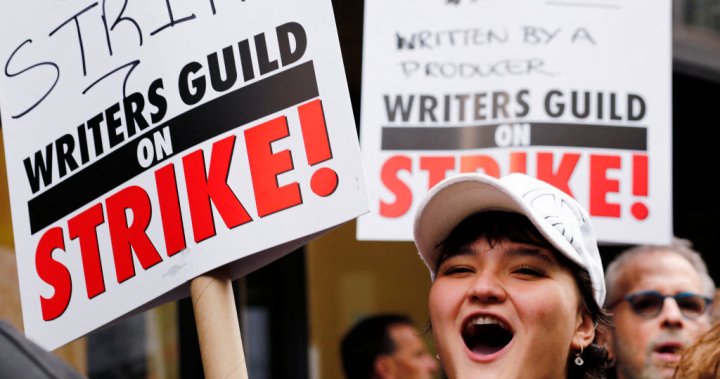Canadian TV viewers might notice the short-term impacts of the Hollywood writers strike as late-night shows go dark this week, but experts say the lasting effects of the work stoppage might come when artificial intelligence rises to feed the content demands of the modern streaming landscape.
While AI might not be ready to staff the writers’ rooms of your favourite television shows quite yet, the technology’s rapid growth has some writers and analysts worried viewers will be stuck with “generic” content in the future unless a new model emerges to compensate the living minds behind today’s original programming.
What’s behind the writers strike?
Writers Guild of America’s units representing 11,500 writers announced Tuesday they would strike after failing to reach a new deal with the Alliance of Motion Picture and Television Producers, marking Hollywood’s first writers’ strike in 15 years.
Production is expected to continue mostly uninterrupted north of the border, says Alex Levine, president of the Writers Guild of Canada central region.

But he tells Global News that the same issues at stake in WGA’s negotiations — poor pay, shorter contracts and smaller writing rooms with more distance from the actual productions — are likely to become sticking points in Canada as well when the writers guild starts negotiations for its own contract later this fall.
The media landscape is completely different from the last writers’ strike a decade and a half ago, Levine says, as the model introduced with the advent of streaming platforms tends to see most writers take home less at the end of the day.
The traditional formula that saw television writers rely on residuals and syndication from reruns of successful shows is waning as hits increasingly bypass cable networks and find success directly on streaming platforms.
“There’s this large middle class of writers that aren’t really able to make a living anymore writing for television,” he told Global News on Tuesday.
Technology analyst Carmi Levy says the streaming era brought about an explosion of content and a way to get shows and movies made without going through the traditional network gatekeepers.
But while it has resulted in more opportunities for writers, it has also made it easier for production companies to outsource gigs to workers overseas who are not bound only to a Hollywood writing staff.
Netflix, for instance, recently announced a US$2.5-billion investment in the development of more Korean television shows after breakout hit Squid Game became the most-watched show in 2021.

The company’s co-CEO Ted Sarandos hinted during Netflix’s earnings call in April that overseas production might offset the impact of a Hollywood shutdown, saying, “if there is (a strike), we have a large base of upcoming shows and films from around the world.”
While that’s greatly diversified the kinds of content that Canadians consume on a daily basis, it’s also comparatively weakened the impact of a strike like this, Levy argues.
“Companies like Netflix and Apple and Amazon can just as easily find writers halfway around the world to fuel their productions,” he says.
“The writing landscape is no longer dominated by Hollywood, and the writers may want to pay attention to that.”
Is AI ‘ready for primetime’?
While the advent of streaming has already upended the way TV shows and movies are produced, Levy says there are other disruptions on the horizon that writers ought to be cognizant of heading into these negotiations.
“We are at an inflection point in technology, largely thanks to the evolution of artificial intelligence,” he says.
New applications such as OpenAI’s ChatGPT, as well as offerings from Microsoft and Google, have shown a remarkable ability to generate text and even adapt voices and writing styles that they’ve been trained to mimic.

WGA’s demands show the union is aware of the existential threat these technologies pose to writers’ work. One of the union’s demands is that the next agreement regulate the “use of material produced using artificial intelligence or similar technologies.”
While he says that today’s AI is nowhere near ready to replace a Hollywood writer, Levy argues the rapid advances the technology has made since going public in recent months should be enough to worry those fighting for their contracts today.
It’s unlikely that production studios will fill in the gaps of the work stoppage with ChatGPT or its contemporaries, but in Levy’s view, that future is not too far out.
“It isn’t quite ready for prime time,” he says of generative AI applications.
“But guess what? By the time the next strike rolls around, it may very well be, and writers may find themselves a few years down the line replaced by technology.”
Levy argues that artificial intelligence is uniquely suited to the cycle of near-constant content generation that modern streaming has wrought.
Production houses are constantly trying to churn out as many new shows and movies as they can in search of the next hit — or at the very least, keep the content stream running long enough to keep audiences subscribed.

Levy says that AI will eventually be “good enough” to fill this role for many producers — but “good enough” is an important caveat.
The more prominent AI is in television and movie production, the more “generic” writing is likely to become, he says.
He compares this phenomenon to advances in animation and music development, where algorithms and mass-produced sounds and graphics have flooded the market in recent years.
“Automation does a couple of things. It scales production up, but it also waters down the quality to a certain extent,” Levy says.
The question is, will viewers notice the drop-off in quality? Levy isn’t sure.
More on Entertainment
Audiences are more distracted than ever while consuming content, he says, with multiple screens and notifications pulling our eyes from device to device.
With these kinds of viewing patterns, the desire for studios to invest in award-winning writing for their projects might be waning, Levy says in a grim portent.
“I dread that future, but I think that’s kind of the direction we’re headed,” he says.
That’s why the WGA strike — and looming negotiations for writers in Canada and in other industries that touch on production — is so critical, Levy says.
If writers can’t strike a deal that sees them able to eke out a living in the modern streaming environment, more and more will have to abandon it altogether, he says.
And the fewer writers are in the room on your favourite TV show, the less quality you can expect in the decades to come, argues the Writers Guild of Canada’s Levine.
“Content is king,” he says. “Writers write the stories. And without the writers, you won’t have good content.”
— with files from The Associated Press




